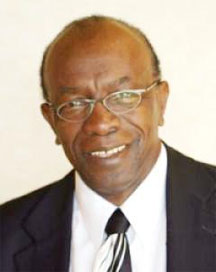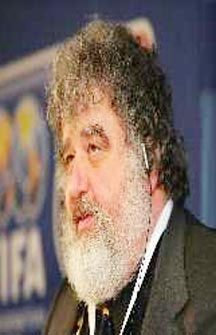WASHINGTON, (Reuters) – The FBI is examining documents charting more than $500,000 in payments made by a Caribbean soccer group to a top U.S. official of the sport that has been shaken internationally by corruption allegations.

According to a U.S. law enforcement officer, a New York-based FBI squad assigned to investigate “Eurasian organized crime” is examining evidence related to payments made to Chuck Blazer, U.S. member of the executive committee of FIFA, the Zurich-based governing body of soccer.
Blazer is also general secretary of CONCACAF, the sport’s governing body in North and Central America and the Caribbean. He has recently sparked controversy by accusing two other top international soccer officials of corruption.
The U.S. law enforcement official would not describe the time frame or extent of the FBI inquiry.
But the official said the probe related to documents whose existence was initially reported by the Independent newspaper of London last weekend and on the www.transparencyinsport.org website by British journalist Andrew Jennings, who specializes in investigating alleged corruption in international sports.
In an e-mail to Reuters, Blazer denounced Jennings’ story as “replete with errors” and said the journalist had a “clear agenda.”
But Blazer did not deny receiving three offshore payments, totalling more than $500,000. Instead, Blazer insisted that “all of my transactions have been conducted legally.”
THREE PAYMENTS
According to the documents, reviewed by Reuters, three payments were made to offshore accounts maintained by Blazer over the last 15 years.

In a letter dated Jan. 29, 1996, Jack Warner, president of the Caribbean Football Union, and until recently president of CONCACAF and vice president of FIFA, instructs the vice president of a bank to wire transfer $57,750 to an account at Barclays Bank in the Cayman Islands maintained by a company called Sportvertising Ltd. The letter says that if any problems arise with the transfer, the bank should contact Blazer at CONCACAF’s New York office.
A 1990 document, signed by both Blazer and Warner and reviewed by Reuters, identifies Blazer as “President” of Sportvertising Inc. The document, headed “retainer agreement”, describes how CONCACAF, via the company, employed Blazer as its general secretary, paying his company both monthly fees and “a 10% override feel on all sponsorships and TV rights fees from all sources received by CONCACAF or for CONCACAF programs/tournaments”, excluding “sponsorships arranged at the local level on tournaments and events.”
Also examined by Reuters are records documenting a $205,000 payment to Sportvertising Inc., dated September 2010. The records includes a notation indicating the payment was on behalf of the Caribbean Football Union (CFU).
A third set of documents also in the FBI’s possession relates to a purported $250,000 payment by the Caribbean Football Union to Blazer earlier this year. A letter to a bank supervisor dated March 31, 2011, signed by Warner, authorizes the bank to issue a draft worth $250,000 to “CHUCK BLAZE” and to debit the Caribbean Football Union’s account accordingly. A second document purports to be a copy of a $250,000 canceled check made out to Chuck Blazer.
BLAZER DEFENDS PAYMENTS
In e-mails to Reuters, Blazer said he had not been contacted by the FBI or notified by them of any investigation.
He said two most recent payments to his company’s Caymans accounts were in his view meant to be repayments to him by Warner of “a significant amount of money” that Blazer says he loaned to Warner in 2004.
Blazer said that as soon as he saw the most recent payment — in the form of a check from the Caribbean Football Union — he “immediately objected”.
“In the past few weeks I have learned that Mr. Warner treated the CFU accounts as his personal accounts and co-mingled a variety of funds in those accounts,” Blazer said. He said he was now “working with the current CFU administration to bring in forensic accountants to attempt to untangle this mess.”
“My financial affairs have been structured legally and with advice of counsel – a standard practice for individuals of my age,” he said.
He also said Warner, once his close ally in tense and tangled internal FIFA politicking, now is “attempting to attack me for having disclosed his unlawful conduct.”
Warner did not respond to a query e-mailed to the Trinidad-based office of the Caribbean Football Union.
Earlier this year, shortly before FIFA’s governing body was scheduled to hold a vote on whether to re-elect the organization’s president, Sepp Blatter, Blazer publicly denounced Warner, a long-time ally, for his alleged involvement in a plot to hand cash bribes to Caribbean soccer officials in return for their votes to support a bid by Qatari soccer official Mohammed bin Hammam to replace Blatter as FIFA chief.
In the wake of Blazer’s allegations, Hammam was investigated by FIFA’s ethics committee on the bribery charges, found guilty of corruption, and banned for life from the game. Hammam is appealing against the FIFA life ban.
Last week, FIFA said it opened ethics proceedings against 16 Caribbean soccer federation officials related to the special meeting of the Caribbean Football Union in May. Warner, a FIFA vice president and longest-serving member of the world soccer groups executive committee, was suspended by FIFA pending an inquiry into Blazer’s bribery allegations. In June, he resigned from all his positions in international soccer. FIFA dropped the investigation into Warner.




